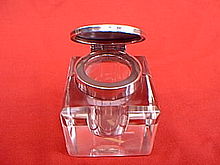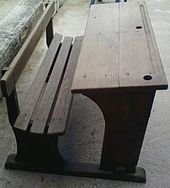Inkwell: Difference between revisions
AtlasDuane (talk | contribs) m Claned up formatting and altered issues tag. |
Template should not be substituted. |
||
| Line 1: | Line 1: | ||
| ⚫ | |||
| ⚫ | |||
| date = {{#if:|{{#switch:{{MONTHNUMBER|{{{1}}}}}|1=January|2=February|3=March|4=April|5=May|6=June|7=July|8=August|9=September|10=October|11=November|12=December|Incorrect required parameter 1=''month''!}}|Missing required parameter 1=''month''!}}{{#time:o}} |
|||
| ⚫ | |||
{{redirect|Inkpot|the Shocking Blue album|Inkpot (album)}} |
{{redirect|Inkpot|the Shocking Blue album|Inkpot (album)}} |
||
| ⚫ | |||
[[File:Inkwell15.jpg|thumb|right|An English silver and glass inkwell, [[hallmark]] date 1910]] |
[[File:Inkwell15.jpg|thumb|right|An English silver and glass inkwell, [[hallmark]] date 1910]] |
||
[[File:Travelling Inkwells.jpg|thumb|Examples of 19c Travelling Inkwells]] |
[[File:Travelling Inkwells.jpg|thumb|Examples of 19c Travelling Inkwells]] |
||
[[File:Ecole-banc1900.jpg|thumb|right|upright|French school desks, c.1900. The holes for the student's inkwells can be seen]] |
[[File:Ecole-banc1900.jpg|thumb|right|upright|French school desks, c.1900. The holes for the student's inkwells can be seen]] |
||
An '''inkwell''' is a small jar or container, often made of [[glass]], [[porcelain]], [[silver]], [[brass]], or [[pewter]], used for holding [[ink]] in a place convenient for the person who is writing. The artist or writer dips the brush, [[quill]], or [[dip pen]] into the inkwell as needed or uses the inkwell as the source for filling the reservoir of a [[fountain pen]]. An inkwell usually has a lid to prevent contamination, evaporation, accidental spillage, and excessive exposure to air. A type known as the '''travelling inkwell''' was fitted with a secure, screw lid so a traveller could carry a supply of ink in their luggage without the risk of leakage. |
An '''inkwell''' is a small jar or container, often made of [[glass]], [[porcelain]], [[silver]], [[brass]], or [[pewter]], used for holding [[ink]] in a place convenient for the person who is writing. The artist or writer dips the brush, [[quill]], or [[dip pen]] into the inkwell as needed or uses the inkwell as the source for filling the reservoir of a [[fountain pen]]. An inkwell usually has a lid to prevent contamination, evaporation, accidental spillage, and excessive exposure to air. A type known as the '''travelling inkwell''' was fitted with a secure, screw lid so a traveller could carry a supply of ink in their luggage without the risk of leakage. |
||
Revision as of 02:45, 18 April 2017
This article includes a list of references, related reading, or external links, but its sources remain unclear because it lacks inline citations. (April 2017) |



An inkwell is a small jar or container, often made of glass, porcelain, silver, brass, or pewter, used for holding ink in a place convenient for the person who is writing. The artist or writer dips the brush, quill, or dip pen into the inkwell as needed or uses the inkwell as the source for filling the reservoir of a fountain pen. An inkwell usually has a lid to prevent contamination, evaporation, accidental spillage, and excessive exposure to air. A type known as the travelling inkwell was fitted with a secure, screw lid so a traveller could carry a supply of ink in their luggage without the risk of leakage.
Inkwells gradually fell out of use in the early part of 20th century[citation needed] as the reservoir fountain pen (which needs to be filled only occasionally) replaced the dip pen, which needed to be dipped in ink after writing a few lines. Holes known as inkwells are a common feature of old school desks, and would have held a small container with the student's ink.
Bibliography
- The Collector's World of Inkwells, Jean & Franklin Hunting, Schiffer Publishing Ltd ISBN 0-7643-1102-6
- The Write Stuff Inkwells Pens & Desk Accessories, Ray & Bevy Jaegers, Krause Publications ISBN 0-930625-86-2
- McGraw's Book of Antique Inkwells Volume 1, Vincent D McGraw, published privately 1972
- Edwardian Shopping 1898-1913 selection facsimile, Army & Navy Stores, David & Charles ISBN 0-7153-7068-5
- Pens & Writing Equipment, Jim Marshall, Miller's ISBN 1-84000-066-X
- English Silver Hallmarks, Judith Bannister, W Foulsham & Co Ltd ISBN 0-572-01181-4
- Handbook of Pottery & Porcelain Marks, J P Cushion, Faber & Faber Ltd ISBN 0-571-04922-2
- Walter's Inkwells of 1885 Book 1, Leo G Walter, published privately 1968
- Inkbottles & Inkwells, William E Covill Jnr, William S Sullwold 1971
- Inkstands & Inkwells A Collector's Guide, Betty & Ted Rivera, Crown Publishers Inc,ISBN 0-517-50419-7
- Inkwells Identification & Values Book 1,Veldon Badders, Schroeder Publishing Inc, ISBN 0-89145-639-2
- Inkwells Identification & Values Book II, Veldon Badders, Schroeder Publishing Inc, ISBN 1-57432-020-3
- Western Writing Implements, Michael Finlay, Plains Books ISBN 1-872477-00-3
- Writing Antiques, George Mell, Shire Publications Ltd ISBN 0-85263-519-2
- Writing Implements & Accessories, Joyce Irene Whalley, David & Charles ISBN 0-7153-6903-2
- Yesterday's Shopping 1907 facsimile, Army & Navy Stores, David & Charles ISBN 0-7153-4692-X
- The Story of Writing, Donald Jackson, Studio Vista ISBN 0-289-70985-7
- The Enormous File, A Social History of the Office, Alan Delgado, John Murray ISBN 0-7195-3612-X
- Doulton Ink Wares, Colin Roberts, BEE Publications ISBN 0-9520547-0-1
